9 Top Keyword Research Tools (Free + Paid)
To compete in today’s market, you need to know the right keywords to target.
With them, you can bring your website and business to the top of search engine result pages (SERPs), increase your traffic, and get more leads and conversions.
Whether you’re looking for a free tool or a paid option, there are plenty of great choices.
Here’s a comparison of the best keyword research tools to consider.
#1 – Semrush
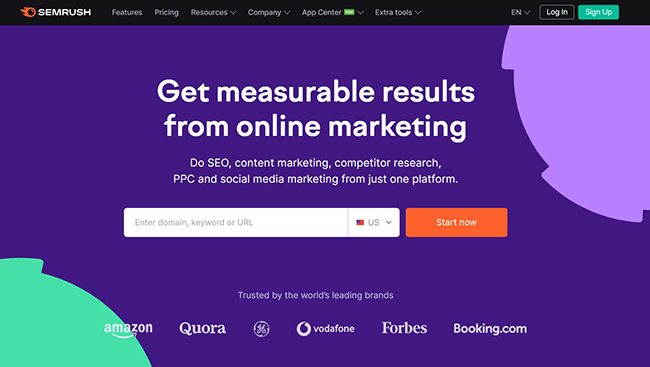
Semrush belongs to the top-rated SEO tools on the market. It’s the ideal choice for marketers and businesses of all sizes, from small to large enterprises.
The suite of features provided by Semrush ranges from keyword research and analysis to backlink management and site auditing.
What’s impressive about Semrush is that it provides comprehensive keyword research tools for its users. Each is designed to help you bring your website to the top of SERPs and increase high-quality traffic.
Semrush has six KW research tools: Keyword Magic Tool, Keyword Gap, Organic Research, Keyword Overview, Organic Traffic Insights, and Keyword Manager.
These tools allow you to access a massive keyword database, discover profitable keyword ideas, find term gaps you can fill, organize and monitor them, and more.
For example, by typing a single term or phrase inside the Keyword Magic Tool, you get a thorough list of keyword suggestions with valuable metrics such as search intent, monthly search volume, CPC, and keyword difficulty (KD.)
They are vital in helping you determine if a particular keyword is worth targeting. So you won’t waste time on keywords that have no chance of generating traffic and conversions.
Besides the Keyword Magic Tool, I find the Keyword Gap Tool a gem of Semrush. If you’re in a competitive niche, it becomes a powerful weapon to get an edge over your rivals.
As the name suggests, this tool lets you discover the keywords your competitors are ranking for that you’re not. You can add these keywords to your content marketing strategy and improve your SEO efforts.
Key features
- Site audit
- On-page SEO
- Local SEO
- Content marketing analysis
- Link-building
- Paid marketing/advertising
- Social media management
- Competitor analysis
Pricing
Plans start from $139.95/month. Annual plans available with further discounts. You can try Semrush with their free trial.
#2 – Mangools
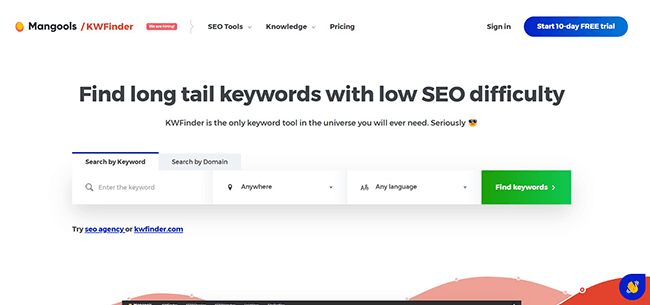
Mangools is a budget-friendly keyword research tool popular among small businesses, marketers, and bloggers.
It also has an extensive SEO tool but let’s focus on KWFinder – Mangool’s keyword research tool.
I’ve used KWFinder, and all I can say is that it’s very intuitive. It’s a great starting point for those new to doing keyword research.
You can use it to find keyword ideas related to your topic alongside their KD, monthly search volume, CPC, and PPC.
So whether you want to use it for content marketing or paid advertising, you’ll find the data you need.
Besides the usual keyword research tool, you can check the terms your competitors use by simply typing their domain in the search box. It will give you an overview of their keyword rankings and difficulty, and visits.
For instance, you want to rank in the travel niche. But you don’t know which keywords to target. Just type in ‘booking.com’ and see what comes up.
You’ll get a comprehensive list of the terms it has. From there, you can decide which ones you want to use for your website or blog. Pretty neat, huh?
However, the feature that makes Mangools stand out is the keyword difficulty accuracy.
Many keyword research tools tend to underestimate or overestimate this. But with Mangools, you get a more accurate representation of keyword difficulty. Multiple studies could back up this claim.
Key features
- Keyword analysis
- Competitor analysis
- SERP analysis
- Rank tracking
- Backlink profile checker
- SEO analysis
- Historical keyword data
Pricing
Free plan available. Paid plans start at €29/month, save 35% with an annual subscription. Mangools offer a 48-hour full refund policy.
#3 – SE Ranking
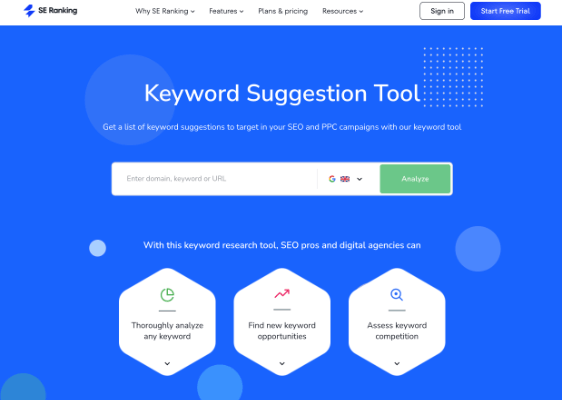
SE Ranking aims to show that successful SEO is achievable by everyone. Its user interface is as simple as it gets.
It won’t bombard you with too many tabs on your dashboard. Instead, you’ll get asked only about your targeted keywords, website details, and top competitors.
After doing these simple steps, SE Ranking will show you an SEO audit and your ranking keywords.
If your business is in the US or Europe, you get access to a vast keyword database. This allows you to uncover a significant number of opportunities.
Besides that, the competitor analysis tool allows you to peek at the list of competitors you’re going up against for a particular keyword. It will then show you their traffic cost, keywords, and number of visits.
This feature is very useful because it allows you to examine your competitors and see the possibility of outranking them. So if your rivals are too big for that specific term, it might be better to target another.
But my favorite feature of SE Ranking is its Keyword Rank Tracker. Besides showing ranking opportunities and algorithm updates, it allows you to avoid cannibalization by showing your web pages targeting the same keyword.
Identifying the issues allows you to make necessary changes to your website before it’s too late.
Key features
- Website audit
- Competitive research
- Backlink monitoring
- On-page SEO
- White label services
- Report builder
- SERP analysis
- Optimization
- Social media monitoring and analysis
Pricing
Plans start from $23.52/month with weekly rankings checks and 250 keywords. Prices vary depending on frequency and keywords. You can try SE Ranking with their free trial.
#4 – Jaaxy
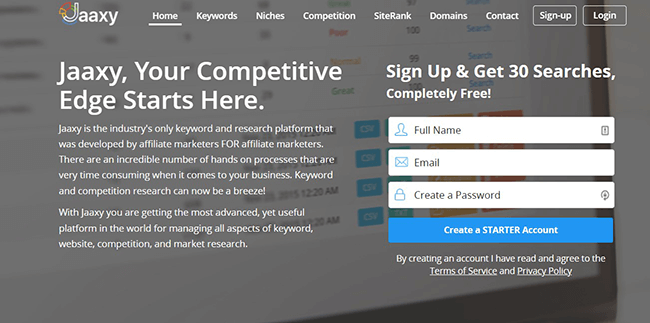
Jaaxy is built for affiliate marketers. But it’s also a good choice for businesses and bloggers.
This keyword research tool falls in the same category as SE Ranking and Mangools regarding ease of use. But it provides data not only from Google, but also from Bing and Yahoo.
It offers primary metrics like search traffic and includes new ones such as the QSR, KQI, and SEO Score.
Let me give you a quick rundown of what these metrics mean:
- QSR (Quoted Search Results). The number of competing websites targeting the same keyword. The lower the score, the better.
- KQI (Keyword Quality Indicator). A colored indicator showing how good or bad a term is for SEO. Green means it’s good, orange is average, and red is bad.
- SEO Score. A number between 0-100 that rates the overall quality of a keyword. A higher score means it’s easier to rank.
Jaaxy also lets you research fast by allowing up to five keyword searches at once. Users who value efficiency will love this function.
What caught my attention, however, is the Alphabet Soup Tool. It’s like a level-up version of keyword suggestion.
Basically, Jaaxy gathers a list of high-traffic long-tailed keywords with low competition from Google Autocomplete.
Although it’s accessible through Google, the list is often unorganized, and you’ll need to do some extra work to find the gems. With Jaaxy, you don’t have to go through that hassle.
To top it off, the Keyword Management function allows you to save, store, share, and export your precious keywords in one place.
Key features
- Niche research
- Keyword suggestions
- Competition analysis
- SEO ranking analysis
- Domain search
- Affiliate opportunities
- Search history
Pricing
Plans start from $49/month. A free plan is also available.
#5 – Question DB
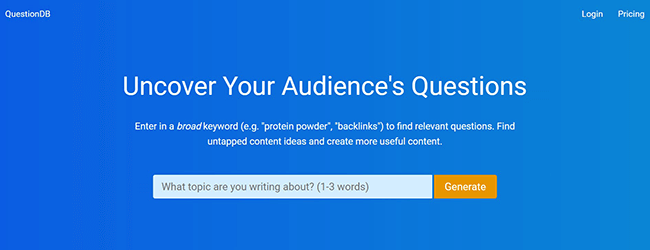
Question DB is a freemium software focused on keyword research. If you only need to do this one task, then it’s a cost-effective solution.
The primary function of Question DB is to generate keywords and questions people are asking based on the topic you provide. Unlike the platforms on this list, it doesn’t show metrics like search volume, keyword difficulty, etc.
It’s only useful for writers and content creators who want to know what their audience is talking about and create articles or videos on that.
On a good note, Question DB allows unlimited searches on their free and paid plans. The only difference is that you get more results if you pay.
Key features
- Keyword ideas
- Questions finder
- Blog topic generator
- Unlimited searches
Pricing
Plans start from $15/month. Annual plans available with further discounts. A free plan is also available.
#6 – Serpstat
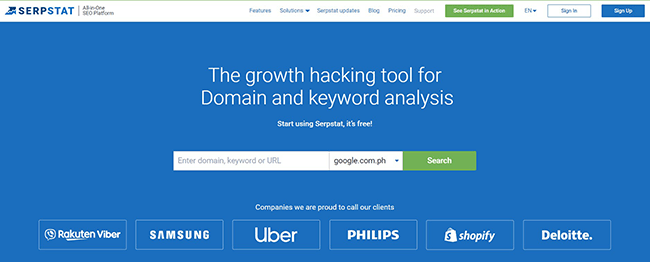
Serpstat is similar to Semrush for its comprehensiveness. It has over 40 tools and keyword research is something it does best. It doesn’t have quite as much data but entry level plans are a bit more affordable.
It’s a superb tool for searching PPC and organic keywords. Serpstat has a massive database, and you’re sure to get accurate and updated results.
With it, you can find high-value keywords for your new ad campaigns or blog content. Plus, retarget more keywords for the existing ones.
Serpstat also offers incredible features like keyword rank tracking, trend analysis, and competitor analysis.
Keyword Tracking lets you monitor mobile and desktop ranking worldwide.
You can quickly identify which keywords are declining or gaining traction in SERPs and make the necessary changes to your SEO strategy. Such as focusing on the keywords that are on the rise.
The Keyword Trend, on the other hand, allows you to see how a keyword is performing over time and in different locations. This tool is very useful for those industries where seasonality plays a significant role.
Key features
- Content analysis
- Backlink analysis
- Keyword grouping
- Local SEO
- Team collaboration
- Rank tracking
- Page audit
- PPC analysis
- Third-party integration
Pricing
Plans start from $69/month. Annual plans available with further discounts. You can try Serpstat for free to get basic access.
#7 – Keyword Tool
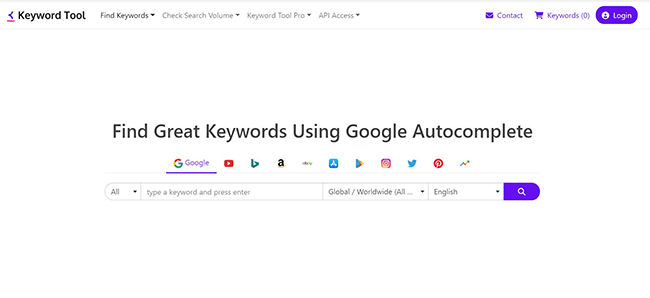
Keyword Tool is freemium software that lets you search keyword opportunities beyond Google search.
You can use it to discover keywords and content ideas on YouTube, Bing, Amazon, eBay, Apple Store, Google Play, Instagram, Pinterest, and even Google Trends.
However, the free version is quite limited and doesn’t show a complete list of metrics like search volume, CPC, and competition.
You must subscribe to the Keyword Tool Pro to access those and view more keyword suggestions.
I like this platform because it’s not only for bloggers or website owners. It’s also for course creators, entrepreneurs, and social media marketers.
For instance, you get video suggestions for your YouTube content. And with the right keywords, you can also increase your chances of appearing on Amazon and eBay’s top pages.
It doesn’t end there, however. By simply typing your seed keyword, this tool will provide the best hashtags you can use on Instagram and Twitter.
The only thing missing here is the keyword difficulty. But Keyword Tool relies on Google Keyword Planner and Google Autocomplete, so you can still get enough long-tailed keywords to choose from.
Currently, Keyword Tool supports over 192 domains and 83 languages, which is quite decent for a free tool.
Key features
- Relevant keyword suggestions
- Organic and ad search
- Social media hashtag finder
- Search volume checker
- Keyword management
Pricing
Plans start from $89/month. Annual plans available with further discounts. You can try Keyword Tool with their free plan.
#8 – Google Keyword Planner
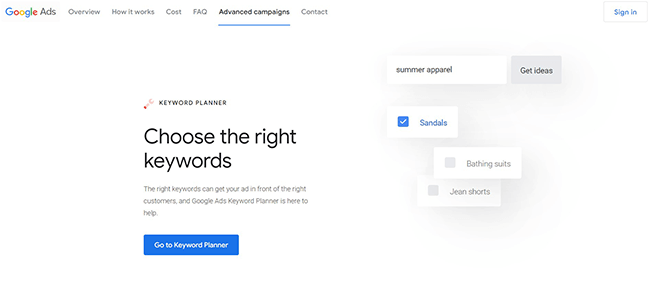
Google Keyword Planner (GKP) has been around since 2013 and is a widely known keyword research tool.
It’s not just a planner but an entire suite of other options to help you with your pay-per-click (PPC) campaigns on Google Ads.
Well, initially, that was its purpose. But with time, it became an invaluable asset for SEOs and content marketers.
Meaning to say, you can use it for organic and paid keyword research.
It’s a pretty simple tool to use, and you can find keyword ideas by entering a website, page URL, or a seed keyword.
Once you enter your seed keyword, GKP will show you related terms, trends, estimated search, CPC, competition level, and more.
If you want to expand your search, GKP provides clickable suggestions. This way, you can quickly sift through thousands of related keywords and find the best ones for your business.
On the other hand, you can also narrow down your choices by filtering keywords by one or multiple factors.
For example, you can view only those keywords with low competition so you can rank easily.
Besides the keyword suggestion tool, GKP also has a Keyword Forecast, which lets you predict traffic for a particular keyword in the future.
Google Keyword Planner also allows you to group negative keywords to fine-tune your campaigns and ensure you’re not bidding on the wrong terms.
Overall, Google Keyword Planner is a good tool for those who want to improve their SEO or run PPC campaigns. The best part is that it’s free to use if you have a Google Ads account.
Key features
- Keyword forecast
- Keyword discovery
- Ad-budget planner
- Geo-targeting
- Time-period comparison
Pricing
Free.
#9 – SEO PowerSuite
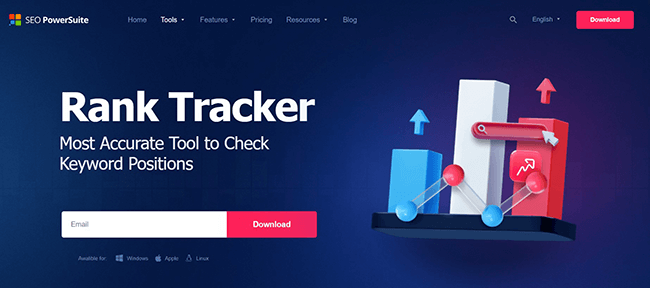
SEO PowerSuite is another one on the list that goes beyond keyword research. It’s a freemium program packed with SEO tools.
The keyword research tools of SEO PowerSuite can be found inside the Rank Tracker. With this software, you can enjoy 24 features and multiple search approaches.
For example, the rank-tracking tool lets you see which keywords your competitors are using and the top-performing ones. Both on mobile and desktop.
You can search by typing your competitor’s page or domain. You can also add other search engines like Yandex, Naver, and Bing to monitor location-specific results.
SEO PowerSuite also has the Keyword Gap Analysis tool that allows you to compare up to five domains. It makes it easier to see keyword opportunities you can exploit to improve your SEO campaign.
Another thing it offers is the TF-IDF Explorer. It might seem like an ordinary tool, but it allows you to spy on your top ten competitors’ high-performing pages and collect all possible keyword opportunities.
If you don’t know who your competitors are and want to find them quickly by simple keyword research, this is the best keyword research tool.
Key features
- Link-building and management tool
- Website audit
- Site visualization
- SERP checker
- Competitor tracking
- Domain analysis
- White-label SEO reports
Pricing
Plans start from $299/month. You can try SEO PowerSuite with their free download.
Conclusion
These are just some of the best keyword research tools for your SEO campaigns. I suggest that you check them out first before looking for others.
If you’re having a hard time picking, here are our top three:
Semrush is an all-in-one platform for those who want a comprehensive SEO solution. It’s already established, so you can be sure it will deliver what it promises. Also includes rank tracking tool, site audit tools and many more tools.
KWFinder by Mangools is an excellent choice if you’re on a budget and need an accurate keyword research tool.
SE Ranking is the most user-friendly platform on the list. It’s perfect for those who want a simple keyword research experience.
The great thing about some of these tools is that they can help with more than just keyword research. For example, Semrush and SE Ranking can help with the SEO content writing process.

